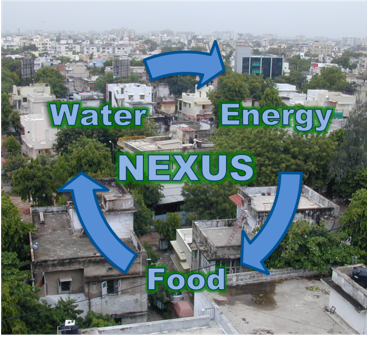Nexus City
Operationalizing the urban Water-Energy-Food Nexus for synergetic climate action in Germany, Australia, China, India and Japan

The aim of this project is to strengthen and further develop an existing international academic network in the target countries concerning the thematic focus “Development of sustainable and resilient cities and in particular the urban Water-Energy-Food (WEF) Nexus”. The project implements networking activities, workshops and research visits, in order to formulate and submit joint funding proposals to the EU Horizon 2020 Framework Programme. Within this context the project develops pilot projects at urban scales in each partner country, through which the implementability of the WEF Nexus approach will be tested in “Urban Labs”. To this end, existing cooperations with suitable partner cities, and partners from industry and various other stakeholder groups are strengthened and expanded.
The project analyzes how decentralized water reclamation with integrated resource recovery coupled with a paradigm shift can become a key building block of more sustainable urban development also in terms of socio-economic context. The project visualizes how value can be created for the products of resource recovery, including water for various reuse applications such as urban agriculture, managed aquifer recharge or toilet flushing, as well as energy generation in form of biogas and organic fertilizer, thereby generating green jobs and enabling a partially self-organized organization (e.g. public private people partnerships) strengthening societal management of resources as opposed to a “top-down” operation. The hypothesis is that this innovative framework can be a foundation for an innovative decision-making and socio-economic governance model, which can enable more sustainable and resilient development of cities under climate change impacts as well as supporting achievement of the UN Sustainable Development Goals (SDGs), der UN-Habitat New Urban Agenda, and the goals of the Paris Climate Agreement.
